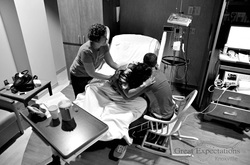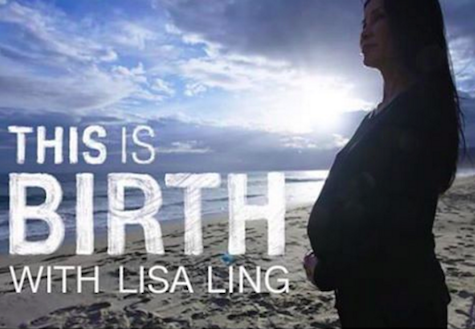|
Our job as doulas is to provide evidence-based information to families who seek us out to support their births. We're supposed to be a blank canvas, a person without judgement about the "right" or "wrong" ways to give birth, because there is no right or wrong way to birth. Because each birth is the "right" birth for the person who gives birth, even if it doesn't go as planned.
But we would be lying to ourselves and our the families that we serve if we presumed to lack an opinion about birth. I think it has to do with our personal preferences for our own births, especially doulas who have given birth themselves. And for doulas like me who hope to one day give birth to living children, I have an idea about the kind of birth I imagine myself to have. So when documentaries come out about birth and about the state of maternal health in our country doulas and birth workers tend to seek them out, study them (and study them again) to make sure that they're giving good information based on the latest evidence about birth. I watched this Lisa Ling special about birth today and I will continue to watch it over and again to tease out information I think is useful for my families. What I do enjoy about this documentary, based solely on my initial viewing, is that it looks at birth from all angles; it tackles racial disparities in maternal health for black people vs. white people, it looks at infertility and how it affects people and families, it looks at surrogacy and it looks at birth by cesarean. And while it would seem that Lisa is coming at it in a sort of biased, wagging a finger way, it's not that way at all. Instead it gives you a glimpse into real scenarios for a majority of families who have babies. Click here to check it out!
0 Comments
 One of the things I often hear is that doulas cost a lot of money. And I get it. When you see a one-time, often up-front price ranging from hundreds to thousands of dollars, it can be intimidating. Add to that the fluctuation of prices from doula to doula, and the process can become overwhelming. So why are we so expensive? Truthfully, we're not. I say that as a person who would gasp (okay, maybe faint) whilst forking over a thousand dollars (or more) for a doula when my time comes. So where does your doula fee go? Experience and Training Most parents who are looking to hire a doula start with where she was trained as well as how much experience she has. Doulas who have been through multiple trainings and have attended a great deal of births tend to charge more for their experience. But, that's not to say that a doula who has only attended a few births doesn't also charge "market price" for her services. While most of the money we earn for births goes towards logistics (more on that later), a chunk of it (at least for me) goes towards advanced training. This ultimately makes for better doulas. The average cost of doula training is about $600, though I have seen it higher for week-long retreat-style trainings. Postpartum training can also range between $600-900. If you want to become a Certified Lactation Consultant, trainings can be as much as $900, and if you'd like to take it further to become an Internationally Board Certified Lactation Consultant, testing costs money as well. Becoming certified in Placenta Encapsulation, Child Birth Education, and Essential Oils and Herbs are trainings that most doulas want to add to their business. We earn these certifications and attend trainings based on our income. Logistics Most doulas go on 24/7 call at least two weeks, but sometimes as early as a month before the time of a client's Estimated Due Date. This means they are essentially "on the clock" 24 hours a day. If I divided my current doula fee* of $850 by two weeks, I would average about $2.52 an hour without counting the amount of time doulas spend with their clients during their birth. Like most doulas, when a client calls me for their birth, I stay by their side until 2 hours after the baby is born and the parents are settled. This also means that we are not taking new clients. We are usually not going on initial consultations or meetings because we could be called to a birth at any moment. We are committed to our clients. Gas, Food, Etc. Doulas pay for their own gas or fare for public transportation to all consultations and prenatal visits. We also make postnatal visits (up to 2, or 3 in some cases) without charging a "postpartum doula fee." While we don't get lunch breaks, we do pay for our food, water, and supplies that we bring to each birth. This can range from books we loan to clients to birthing balls, rebozos, etc. Personal Sacrifice When a doula goes on call, she/he does so with the knowledge that at any time we could be called for a birth. This means we miss family time, vacations and trips, or nice dinners with our significant others. And when the time comes for baby to be born, we leave our full time jobs (if we work outside of doula-ing), family, and children for an undefined amount of time. Is it Worth it? I can't say that for anyone (typical doula answer). The evidence shows that having a doula-attended birth results in less intervention, fewer cases of unplanned c-section, better management of labor pains, shorter labors, and healthier breastfeeding relationships. Like most doulas, I'm not in it for the money. I do what I do because I'm passionate about it. I love helping people become parents. There is still nothing more awe-inspiring than watching a baby be born. I get a rush from the sheer power and determination of women in labor and nothing beats the smell of amniotic fluid clinging to your clothes. The oxytocin that baby and new parent emit is intoxicating and contagious. I always tell parents that I interview with that they should pick a doula not by how much she costs, or her experience, but by how you feel when you are in her presence. And to my mind, that presence is priceless.  So what is the evidence for doulas? In 2012, Hodnett et al. published an updated Cochrane review on the use of continuous support for women during childbirth. They pooled the results of 22 trials that included more than 15,000 women. These women were randomized to either receive continuous, one-on-one support during labor or “usual care.” The quality of the studies was good.Continuous support was provided either by a member of the hospital staff, such as a midwife or nurse (9 studies), women who were not part of the woman’s social network and not part of hospital staff (doula 5 studies; childbirth educators 1 study, retired nurses 1 study), or a companion of the woman’s social network such as a female relative or the woman’s partner (6 studies). In 11 studies, the husband/partner was not allowed to be present at birth, and so continuous support was compared to no support at all. In all the other studies, the husband or partner was allowed to be present in addition to the person providing continuous labor support. Overall, women who received continuous support were more likely to have spontaneous vaginal births and less likely to have any pain medication, epidurals, negative feelings about childbirth, vacuum or forceps-assisted births, and C-sections. In addition, their labors were shorter by about 40 minutes and their babies were less likely to have low Apgar scores at birth. What does this mean? It means that if you have continuous labor support (that is, someone who never leaves your side), you are statistically more likely to have better outcomes and your baby is more likely to have better outcomes! How did doulas compare to the other types of continuous support? The researchers also looked to see if the type of support made a difference. They wanted to know—does it matter who you choose for your continuous support? Does it matter if you choose a midwife, doula, or partner for your continuous support? They were able to look at this question for 6 outcomes: use of any pain medication, use of Pitocin during labor, spontaneous vaginal birth, C-section, admission to special care nursery after birth, and negative ratings of birth experience. For most of these outcomes,* the best results occurred when woman had continuous labor support from a doula– someone who was NOT a staff member at the hospital and who was NOT part of the woman’s social network. When continuous labor support was provided by a doula, women experienced a:
Why are doulas so effective? A doula can act as a buffer in a harsh environment. There are 3 main reasons why we think doulas are so effective. The first reason is the “harsh environment” theory. In most developed countries, ever since birth moved out of the home and into the hospital, women have been giving birth in conditions that can often be described as harsh. In the hospital, laboring women are frequently submitted to institutional routines, high intervention rates, personnel who are strangers, lack of privacy, bright lighting, and needles. Most of us would have a hard time dealing with these conditions when we’re feeling our best. But women in labor to deal with these harsh conditions when they are in their most vulnerable state. These harsh conditions may slow down a woman’s labor and decrease the woman’s self-confidence. It is thought that a doula “buffers” this harsh environment by providing continuous support and companionship which promotes the mother’s self-esteem (Hofmeyr, Nikodem et al. 1991). A dad says: “My experience has shown me that, whether you’re giving birth in the hospital, birth center, or at home, your impact and ability to connect and support your wife during the birth process is both supported and maximized by having a doula there on your team.” Credit: www.yourbirthjourney.net and Seattle Birth Photography The third reason that doulas are effective is becausedoulas are a form of pain relief (Hofmeyr, 1991). With continuous support, women are less likely to request epidurals or pain medication (Hodnett, 2011). Why are women with doulas less likely to request pain medications? Well, women are less likely to request pain medications when they have a doula because they just don’t need an epidural as much! Women who have a doula are statistically more likely to feel less pain when a doula is present.Furthermore, by avoiding epidural anesthesia, women may avoid many medical interventions that often go along with an epidural, including Pitocin augmentation and continuous electronic fetal monitoring (Caton, Corry et al. 2002). Read the entire article here. |
Details
AuthorHi there! I'm Erika Davis and I'm a doula working in the Seattle and South Puget Sound area. Archives
December 2018
Categories
All
|

 RSS Feed
RSS Feed